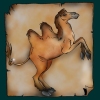Namnöversättning
| Tolkien (första förekomst) |
Åke Ohlmarks | Erik Andersson | Kamelen |
|---|---|---|---|
| oliphaunt (Bok IV, kapitel 3: Svarta porten är stängd) |
olifant | olifant | olifant |
| Tolkiens översättningsguide | |||
| Oliphaunt. Retain this. It is an archaic form of 'elephant' used as a 'rusticism', on the supposition that rumour of the Southern beast would have reached the Shire long ago in the
form of legend. This detail might be retained simply by substituting O for the initial E of the ordinary name of the elephant in the language of translation: the meaning would remain sufficiently obvious, even if that language had no similar archaic form. In Dutch olifant remains the current form, and so is used by the translator, but with loss of the archaic colouring. Oliphant in English is derived from Old French olifant, but the o is probably derived from old forms of English or German: Old English olfend, Old High German olbenta 'camel'. The names of foreign animals, seldom or never seen, are often misapplied in the borrowing language. Old English olfend, Old High German olbenta, are probably ultimately related to the classical elephant (Latin from Greek). |
|||
| Kommentar | |||
| Översättningen till olifant känns rätt självklar; jag tog mest med den här för att få anledning att lägga ut Tolkiens intressanta lilla text ur Guiden. Noteras kan att olifant på svenska faktiskt är ett ord i egen rätt, ett medeltida strids- eller jakthorn av snidat elfenben. I synnerhet avses Rolands horn ur den fornfranska Rolandssången, som heter just så. Men ordet har förstås precis samma etymologiska rötter som elefant. Senast uppdaterad: 2018-11-27 14:11:41 |
|||
| Tolkien | Åke Ohlmarks |
|---|---|
| oliphaunt | olifant |
| Erik Andersson | Kamelen |
| olifant | olifant |
| Tolkiens översättningsguide | |
| Oliphaunt. Retain this. It is an archaic form of 'elephant' used as a 'rusticism', on the supposition that rumour of the Southern beast would have reached the Shire long ago in the
form of legend. This detail might be retained simply by substituting O for the initial E of the ordinary name of the elephant in the language of translation: the meaning would remain sufficiently obvious, even if that language had no similar archaic form. In Dutch olifant remains the current form, and so is used by the translator, but with loss of the archaic colouring. Oliphant in English is derived from Old French olifant, but the o is probably derived from old forms of English or German: Old English olfend, Old High German olbenta 'camel'. The names of foreign animals, seldom or never seen, are often misapplied in the borrowing language. Old English olfend, Old High German olbenta, are probably ultimately related to the classical elephant (Latin from Greek). |
|
| Kommentar | |
| Översättningen till olifant känns rätt självklar; jag tog mest med den här för att få anledning att lägga ut Tolkiens intressanta lilla text ur Guiden. Noteras kan att olifant på svenska faktiskt är ett ord i egen rätt, ett medeltida strids- eller jakthorn av snidat elfenben. I synnerhet avses Rolands horn ur den fornfranska Rolandssången, som heter just så. Men ordet har förstås precis samma etymologiska rötter som elefant. Senast uppdaterad: 2018-11-27 14:11:41 |
|



